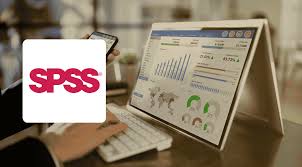Quantitative Data Analysis Software (SPSS, Stata) Advanced Training Course
Quantitative Data Analysis Software Advanced Training Course is designed to equip researchers, analysts, data scientists, and professionals with practical expertise in utilizing these powerful software tools for statistical modeling, data interpretation, and evidence-based reporting.

Course Overview
Quantitative Data Analysis Software Advanced Training Course
Introduction
In today’s data-driven world, advanced skills in quantitative data analysis are essential for research, policy development, academic inquiry, and data-centric decision-making. Quantitative Data Analysis Software Advanced Training Course is designed to equip researchers, analysts, data scientists, and professionals with practical expertise in utilizing these powerful software tools for statistical modeling, data interpretation, and evidence-based reporting. The course delves deeply into descriptive statistics, inferential analysis, regression modeling, multivariate techniques, and predictive analytics, offering hands-on experience that transforms theoretical knowledge into practical application.
This industry-relevant training focuses on real-world datasets, automation of analysis procedures, and custom script development for reproducibility and efficiency. Participants will master techniques such as logistic regression, time series forecasting, hypothesis testing, ANOVA, and factor analysis using both SPSS and Stata platforms. Whether you are analyzing health data, financial metrics, or survey responses, this course provides the analytical edge to uncover meaningful patterns, trends, and actionable insights.
Training Objectives
- Understand the advanced functionalities of SPSS and Stata.
- Apply descriptive and inferential statistics on real-world datasets.
- Execute regression models including linear, logistic, and multilevel modeling.
- Use SPSS and Stata for data cleaning, transformation, and management.
- Conduct time series and forecasting analyses.
- Analyze variance through ANOVA and MANOVA techniques.
- Perform factor analysis and principal component analysis (PCA).
- Automate repetitive tasks using syntax (SPSS) and do-files (Stata).
- Visualize data using built-in graphical tools and custom plotting.
- Generate and export comprehensive reports in multiple formats.
- Interpret output for academic and professional dissemination.
- Develop reproducible workflows for collaborative research projects.
- Integrate data analysis techniques in evidence-based decision making.
Target Audiences
- Academic researchers and postgraduate students
- Data analysts and data scientists
- Government statisticians and policy analysts
- Monitoring and evaluation professionals
- Health and epidemiology researchers
- Financial and economic analysts
- NGO and international development practitioners
- Business intelligence professionals
Course Duration: 5 days
Course Modules
Module 1: Introduction to SPSS and Stata for Advanced Users
- Overview of SPSS and Stata interfaces
- Setting up projects and managing datasets
- Importing, exporting, and transforming data
- Introduction to syntax (SPSS) and do-files (Stata)
- Navigating output windows and customizing results
- Case Study: Managing and preparing a large health survey dataset
Module 2: Descriptive and Exploratory Data Analysis
- Frequencies, crosstabs, and descriptive stats
- Data visualization: histograms, boxplots, scatterplots
- Exploring distributions and detecting outliers
- Normality testing and data transformation
- Comparing groups using mean differences
- Case Study: Socioeconomic indicators from a regional census
Module 3: Inferential Statistics and Hypothesis Testing
- Parametric and non-parametric tests
- Chi-square, t-tests, and correlation
- Confidence intervals and effect sizes
- Post-hoc analysis and interpretation
- Statistical significance vs. practical significance
- Case Study: Testing intervention effectiveness in education
Module 4: Regression Modeling Techniques
- Simple and multiple linear regression
- Logistic regression (binary and multinomial)
- Assessing model fit and assumptions
- Interaction terms and dummy variables
- Interpreting coefficients and outputs
- Case Study: Predicting household expenditure using survey data
Module 5: Multivariate Analysis
- MANOVA, MANCOVA, and discriminant analysis
- Principal Component Analysis (PCA)
- Factor extraction and rotation methods
- Clustering and classification techniques
- Model validation and diagnostics
- Case Study: Reducing survey items using PCA in public health research
Module 6: Time Series and Forecasting
- Time series components and decomposition
- Autocorrelation and stationarity tests
- ARIMA modeling and forecasting
- Trend analysis using moving averages
- Seasonal adjustments and predictions
- Case Study: Forecasting inflation trends using macroeconomic data
Module 7: Automation and Advanced Scripting
- Writing and executing syntax scripts in SPSS
- Automating analysis with Stata do-files
- Creating custom templates and macros
- Looping and conditional statements
- Efficient workflow documentation
- Case Study: Automating monthly reports for NGO program evaluation
Module 8: Reporting and Data Presentation
- Exporting tables, graphs, and results
- Customizing charts and visual reports
- Interpreting statistical outputs for stakeholders
- Creating reproducible reports for publication
- Ethics in data reporting and visualization
- Case Study: Reporting clinical trial results to stakeholders
Training Methodology
- Interactive lectures and demonstrations
- Hands-on exercises using real-world datasets
- Group discussions and knowledge-sharing
- Individualized mentorship and feedback
- Assignments and project-based assessments
Register as a group from 3 participants for a Discount
Send us an email: info@datastatresearch.org or call +254724527104
Certification
Upon successful completion of this training, participants will be issued with a globally- recognized certificate.
Tailor-Made Course
We also offer tailor-made courses based on your needs.
Key Notes
a. The participant must be conversant with English.
b. Upon completion of training the participant will be issued with an Authorized Training Certificate
c. Course duration is flexible and the contents can be modified to fit any number of days.
d. The course fee includes facilitation training materials, 2 coffee breaks, buffet lunch and A Certificate upon successful completion of Training.
e. One-year post-training support Consultation and Coaching provided after the course.
f. Payment should be done at least a week before commence of the training, to DATASTAT CONSULTANCY LTD account, as indicated in the invoice so as to enable us prepare better for you.